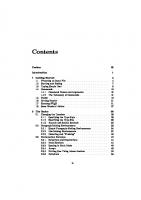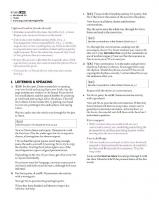File On Gorky 9781408161319, 9780413650603, 9781408153765
Writers-Files is an important series documenting the work of major dramatists of the last hundred years. Each volume con
180 79 16MB
English Pages [101] Year 1993
Recommend Papers

- Author / Uploaded
- Cynthia Marsh (editor)
File loading please wait...
Citation preview
Abbreviations Books PSS M. Gofkii, Pol'me sobrame sochinemi, Moscow, 1968-76, [Complete Collected Works, of which Volume VI (Moscow, 1970) and Volume XII (Moscow, 1972) are the main volumes cited. Location and date of publication given on first citation only.J SS M, Gor'kii, Sobrame sochinemi, Moscow, 1949-66, {Collected Works.} Sob. soch. Sobrame sochinemi {Collected Works, by other writers J. Theatres MAT Moscow Art Theatre, BUT Bol'shoi dramaticheskii teatr [Large Dramatic Theatre], Leningrad. MGSPS Moskovskii gorodskoi sovet professional'nykh soiuzov [Theatre of the Moscow Soviet of Trade Unions, 1930-38. Before 1938 known as MGSPS, after 1938 as Theatre of the Moscow Soviet]. RSC Eoyal Shakespeare Company. 4
The theatre is, by its nature, an ephemeral art yet it is a daunting task to Hack down the newspaper reviews, or contemporary statements from the writer or his director, which are often all that remain to help us recreate some sense of what a particular production was like. This series is therefore intended to make readily available a selection of the comments that the critics made about the plays of leading modem dramatists at the time of their production — and to trace, too, the course of each writer's own views about Ms work and his world. In addition to combining a uniquely convenient source of such elusive documentation* the 'Writer-Files* series also assembles the information necessary for readers to pursue further their interest in a particular writer or work. Variations in quantity between one writer's output and another's, differences in temperament which make some readier than others to talk about their work, and the variety of critical response, all mean that the presentation and balance of material shifts between one volume and another: but we have tried to arrive at a format for the series which will nevertheless enable users of one volume readily to find their way around any other. Section I, 'A Brief Chronology*, provides a quick conspective overview of each playwright's life and career. Section 2 deals with the plays themselves, arranged chronologically in the order of their composition: information on first performances, major revivals, and publication is followed by a brief synopsis (for quick reference set in slightly larger, italic type), then by a representative selection of the critical response, and of the dramatist's own comments on the play and its theme. Section 3 offers concise guidance to each writer's work in non-dramatic forms, while Section 4, *The Writer on His Work', brings together comments from the playwright himself on more general matters of construction, opinion, and artistic development. Finally, Section 5 provides a bibliographical guide to other primary and secondary sources of further reading, among which full details will be found of works cited elsewhere under short titles, and of collected editions of the plays — but not of individual titles, particulars of which will be found with the other factual data in Section 2. The 'Writer-Files* hope by striking this kind of balance between information and a wide range of opinion to offer 'companions* to the study of major playwrights in the modern repertoire — not in that dangerous pre-digested fashion which
General Editor's Introduction can too readily quench die desire to read die plays themselves, nor so preser%tively as to allow any single line of approach to predominate, hut rather to encourage readers to form tfieir own judgements of the plays in a wide-ranging context. Maxim Gorky's place in the Russian as distinct from die former Soviet theatre is in process of painful reassessment. To have been neglected as old-fashioned in die creative and relatively open artistic environment of die 1920s, and dien held up as a model of socialist realism amidst die oppression of die 1930s, is scarcely a recommendation in die present political climate. And yet Gorky wrote largely, almost obsessively, of iiose most capitalist of institutions, die family and die small business - a preoccupation underlined by die inclusiveness of diis Writer-File, as earlier by die succession of RSC productions of die lesser-known plays, which revealed The Lower Depths to have been, if still his masterpiece, uncharacteristic in its chosen milieu. Thus, afthough die bourgeois focus of Gorky's plays was declared by one respected Soviet critic (as here recorded on page 55) to have been 'a reflection of class conflicts', diose conflicts today seem as rooted in die perceptions of Freud as of Marx,, As one of his leading translators into English, Jeremy Brooks, points out on page 32, this helps to account for me favourable response towards die RSC productions of meir British audiences, who are more comfortably attuned dian meir European neighbours to appreciating political conflict widiin me familial microcosm man as a matter of 'whedier you live or die tomorrow*. Increasingly, die strong man in Gorky's various family groups turns out to be a woman - sometimes overweening in an almost Strindbergian fashion, but more often widi a force of will mat is outwardly-directed in its fierce protection of die security of me home, and of its economic underpinning. Then, again, in The Old Man especially, there are qualities (as here discussed on page 78) mat are recognisably Ibsenesque - notably Gorky's sense of the determining effects of past actions upon present behaviour, and his increasing inclination to probe die individual radier than the collective psyche. Such associations are helpful in so far as mey direct our minking outwards from die more commonplace comparisons widi Chekhov - whose families seem almost English in dieir allusive reticence besides me Slavic implosiveness of Gorky's. Yet diere is much, too, in his later characters - mose small businessmen eternally unfulfilled or, like Egor Bulycbev, clinging to die flimsiest hopes of redemption - mat relates diem to die compulsive dreamers of The Lower Depths, No more can we finally assert of die foxy merchant Bulycbev than of me vagrant Luka whetfier he is life-affirming or life-denying in his dreams. Simon Trussler 6
1868 16 March: Aleksei Maksimovich reshkov (Gorky's real name) bom in Nizhnii Novgorod (known in this century variously as Nizhegorod and Gorky), the major town at the point where the Oka flows into the Volga. Father a boatyard carpenter. 1871 Father transferred as boatyard manager to Astrakhan, but shortly afterwards dies of cholera. Aleksei returns with mother to her parents, who own a small dye works. Graphic account of early years in first volume of his autobiography, Childhood. 1879 Mother dies of tuberculosis. Aleksei works in a shoeshop as general dogsbody. 1880 Apprenticed to draftsman: treated badly, and runs away as cabin boy on Volga steamboat. Tries other professions, including icon painting, watchman at a building site, clerk. Spends spare time reading. Mixes with students, tramps, and prostitutes. 1884 Leaves for Kazan*, possibly to study. Lives from, hand to mouth, often taking odd jobs in docks. Mixes with students. Realizes he is unsuited to discipline of study. 1887 Working in a bakery. Feb.: death of his grandmother affects him deeply. Dec.: attempts suicide. 1888 Works among peasants at Krasnodivovo with a radical colleague. Disillusioned, wanders in the Volga region, Works for a time in Tsaritsyn (later to be known as Stalingrad and Volgograd) as a menial in railway administt'ation. Spends free time reading. Interest in Tolstoyism. Begins to write, 1889 Makes way to Moscow to visit Tolstoy, but he is absent on pilgrimage. Returns to Nizhnii Novgorod and lives with, radicals: under surveillance. Works in brewery, then for a lawyer. Contacts the writer ¥ . G, Korolenko to show him his work: disillusioned by his comments. 1891 Sets off on journey working his way through Russia and Ukraine, mostly on foot, 1892
Encouraged to write again: 'Makar Chudra*, a short
A Brief Chronology story, published in Caucasus under the pseudonym of Maxim Gorky ('Bitter'). Returns to Nizhnii Novgorod. Works for lawyer again. Several short stories published 1895
Moves to Samara to work as newspaper columnist.
1896 Returns to Nizhnii Novgorod as editor. Marries E. P. Volzhina. Tuberculosis diagnosed. 1897 With help from a literary fond in Petersburg, Peshkovs leave for convalescence in Crimea. July; son Maxim born. 1898 May: arrested in Nizhnii Novgorod for previously associating with radicals. Placed under strict surveillance. First collection of short stories published in Petersburg: a sellout. Sends it to Chekhov as a token of his admiration. 1899 Publication of his first novel, Foma Gordeev, March: Gorky meets Chekhov in Yalta, Popularity enormous: Repk paints Ms portrait, and Gorky regarded as model for radical literature and politics. 1900 Speaks out against conscription of radical students. Meets Tolstoy. 1901 Joins demonstration in favour of students in Petersburg. Placed under house arrest. Radical novel The Three of Them published. May: daughter Ekaterma bom. Nov.: allowed to go to Crimea for health. Demonstrations of support accompany him. Philistines in rehearsal at Moscow Art Theaore (MAT). Stays with Chekhov in Crimea for week. Visits Tolstoy. 1902 Election to Academy of Sciences cancelled following Tsar's objection. Chekhov and Korolenko resign. March: Philistines opens amid intense controversy while MAT on tour to Petersburg. Ordered to Arzamas. Completes The Lower Depths: opens in Dec., to loud acclaim. 1903 Joins Znanie publishing house. Widely popular for his work among radicals, liberals, and the reading public at large, but figure of suspicion elsewhere in establishment. Separates from wife. 1904 July: deeply affected by death of Chekhov. Nov.: premiere of Summerfalk at Kommissarzhevskaia's Theatre, Petersburg: denounced by the artistic elite as propaganda. 1905 8
Jan.: involved in events of Bloody Sunday; arrested and irnpris-
A Brief Chronology oned for his protest. Writes Children of the Sun in prison. International call for his release. Sent to Riga under police surveillance. Involved in Bolshevik press. Oct.: tempestuous premiere of Children of the Sun (MAT). Nov.: meets Lenin, newly returned from exile. 1906 Goes to America via France with M. Andreeva, partly to escape reaction in Russia and to win support for the Bolsheviks. Enjoys international acclaim, but scandal in America when discovered Andreeva and Gorky not married. Completes novel, The Mother, and play, Enemks. Aug.: daughter dies in Russia. Nov.: premiere of Barbarians in Riga. 1907 Feb: premiere of Enemies, Berlin. Takes refuge in Italy, residing finally in Capri. Stays until 1913. Stream of political and literary visitors in these years, including Lenin. 1968 Confession published: reflects interest in fusion of Christianity and Marxism (referred to as * god-building*). June: premiere of The Last Ones, Tashkent. 1910 Details of the death of Tolstoy appal him. Begins publication of long novel The Life of Matvei Kozhermatin. Oct.: premiere of The Eccentrics in Petersburg and of The Reception m Kiev. 1911 Feb.: premiere of Vassa IMeleznma (first version), Moscow. 1912 Begins work on The Zykovs 1913 First volume of autobiographical trilogy, Childhood, published. Begins work on Counterfeit Coin, Dec: returns to Russia under amnesty. 1915 Sets up journal Letopis' (The Chronicle): does not always follow strict Bolshevik line,toLenin's wrath. Completes The Old Man. 1916 Second volume of autobiography, In the World, published in Letopis'. 1917 Founds newspaper Novaiazhizn (New Life). 1918 July: premiere of The Zykovs, Pebrograd. New Life closed down on Lenin's orders. Gorky accommodates himself to Bolshevik cause. 1919 Jan.: premiere of The Old Man, Moscow. Intercedes with Bolsheviks on behalf of intellectuals. Organizes committee to protect Russia's cultural heritage. 9
A Brief Chronology 192© Separates from Andreeva in favour of M. Budberg. June: Workaholic Shvotekov, premiered in Petrograd, banned after four performances. 1921 Health undermined, leaves for sanatorium in Black Forest, and remains in Germany. 1923 Party to setting up journal Beseda (Conversation) in Berlin in an attempt to reconcile Soviets and emigres. Publication of third volume of autobiography, My Universities, 1924
Returns to Italy. Debarred from Capri, stays in Sorrento.
1925 Publication of novel The Artamanov Affair in Berlin. Undertakes final novel The Life ofKlim Samgin (unfinished at his death). 1926
Completes Counterfeit Coin.
1928 May: returns to Moscow for six months. Immense official and popular reception. Winters in Sorrento. Italian premiere of Counterfeit Coin, Rome and Naples, 1929 May, again returns to Moscow, including trip on Volga in itinerary. Oct.: returns to Sorrento in deteriorating health. 193© Writes Somov and the Others. 1931 May: returns to Moscow. Highly decorated and honoured. Oct.: returns to Sorrento. Completes Egor Bulychev and the Others. 1932 May-Oct.: visit to Russia. Sept.: premiere of Egor Bulychev and the Others, Moscow, Leningrad. Completes Dostigaev and the Others. 1933 May: final departure from Italy for Russia. Leads life of prominent public figure, but also watched. Moscow house centre of intellectual life. Becomes spokesman for Soviet view on art and literature. Nov.: premiere of Dostigaev and the Others, Leningrad and Moscow. 1934 Feb: MAT premiere of Egor Bulychev and the Others. May: son Max dies, Aug.: chairman of first Congress of Soviet Writers. 1935 Undertakes triumphant tour on Volga. Health deteriorates. Winter k. Crimea. Completes second version of Vassa Zheleznova. 1936 10
Returns to Moscow in. May, and dies on 18 June.
a: Major Plays
>>
Philistines
£
'Scenes in the House of Bessemenov. A Dramatic Sketch in Four Acts.' WWff«#t.« 1901. Awarded the Griboedov ftize, 19








![The Facts on File Dictionary of Biotechnology and Genetic Engineering, Third Edition (Facts on File Science Dictionaries) [3 ed.]
0816063516, 9780816063512, 9781438109367](https://ebin.pub/img/200x200/the-facts-on-file-dictionary-of-biotechnology-and-genetic-engineering-third-edition-facts-on-file-science-dictionaries-3nbsped-0816063516-9780816063512-9781438109367.jpg)
